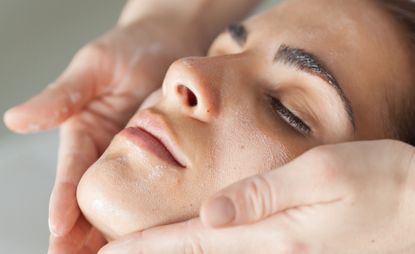This is what microbeads are - and why they're finally being banned
You've probably been using them for years


You've probably been using them for years
With microbeads taking over headlines in the news this week, seeing as the UK government have finally put a ban on plastic microbeads in beauty products (two years after Barack Obama banned them in the US), everyone's been asking just what they are.
The legislation will come into play later this year but will only be in place for 'rinse-off' products for now as its 'putting marine wildlife under serious threat,' as said by our Environment Secretary Michael Gove.
But, microbeads have proven to be a risk to human health, too, as we could be breathing in and ingesting (via the foodchain) chemical-laden microplastics as well - so it's about time we have this conversation.
What are microbeads?
Microbeads are basically teeny tiny bits of plastic found in toiletries including face scrubs, shower gels, exfoliators, toothpastes, and shower gels.
Why use microbeads?
Because they're cheaper and easier to manufacture and they have a long shelf life because they're plastic.
Microbeads ban
Why are they being banned all over the world? Well, let us explain. As microbeads are tiny little pieces of non-biodegradable plastic, they easily go down your plughole and through water filtration systems and end up in our oceans, seas, rivers and lakes - and stay there forever. And, every time you use a product with microbeads in them, you're flushing around 100,000 microbeads into these waters which are then ingested by sea life or birds. And yep, you've guessed it, then eaten by humans who eat fish etc.
Marie Claire Newsletter
Celebrity news, beauty, fashion advice, and fascinating features, delivered straight to your inbox!
Microbead alternatives
Soon, we won't be able to access any 'rinse-off' products with microbeads in them in the UK any more but avoid them in general as they won't be banned in 'leave-on' toiletries by getting more natural beauty products that make use of natural elements like salt, sugars and coffee as a natural exfoliant.
You can ensure you're making informed choices about the products you're using by knowing exactly what's in them and what those ingredients mean.
-
 Courteney Cox opens up about fiancé Johnny McDaid dumping her 'one minute into therapy'
Courteney Cox opens up about fiancé Johnny McDaid dumping her 'one minute into therapy'They've since got back together
By Iris Goldsztajn
-
 Billie Eilish has opened up about feeling 'outed' on the red carpet
Billie Eilish has opened up about feeling 'outed' on the red carpet'The whole world suddenly decided who I was, and I didn’t get to say anything or control any of it.'
By Iris Goldsztajn
-
 Princess Charlotte has a very impressive secret talent that makes Kate 'very happy'
Princess Charlotte has a very impressive secret talent that makes Kate 'very happy'The 8-year-old has so many talents!
By Iris Goldsztajn